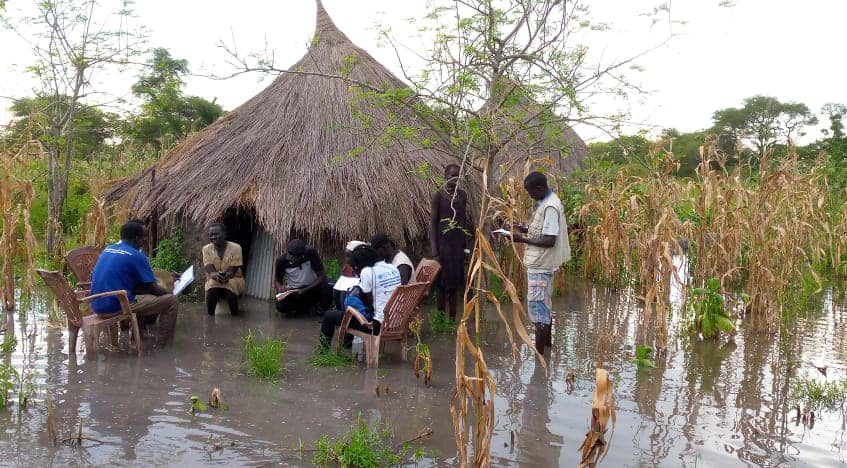You are here: Home | Humanitarian | News | Over half South Sudanese projected to go hungry in 2024: UN

Humanitarian workers conducted assessment in a flood-affected village in South Sudan. 2020. (Photo: Hope Restoration South Sudan)
Two United Nations officials on Monday said the world must pay attention to the deteriorating food insecurity situation in South Sudan, where more than half the country population is enduring hunger.
In a joint press statement, Reena Ghelani, UN Famine Prevention and Response Coordinator, and Marie Helene Verney, Acting Humanitarian Coordinator, said multiple crises including climate change, conflict and economic hardship in South Sudan are pushing millions of people further into food insecurity.
Humanitarian actors have estimated that 9 million people in South Sudan would need support in 2024.
Meanwhile, the Integrated Food Security Phase Classification projects about 56% of South Sudan’s population – the highest percentage in the world – to experience high levels of food insecurity.
The latest IPC data also indicates that about 25,000 people including many refugees who fled the conflict in Sudan are experiencing catastrophic levels of hunger.
It said the number could rise to nearly 80,000 in the next coming months unless urgent support is provided.
The statement published by UN Office for Coordination of Humanitarian Affairs (OCHA), further said an estimated 1.6 million children below the age of five years are expected to suffer from acute malnutrition from July 2023 to June 2024.
OCHA said this is during a time when aid agencies are forced to halve rations and reduce their support due to funding cuts dictated global crisis including the wars in Eastern Europe and the Middle East.
South Sudan has one of the worst food insecurity emergencies in the world due to extreme levels of food insecurity and malnutrition, the agency said.
“We can’t let people starve on our watch. I’ve seen how women and young people can produce their own food and become self-sufficient when provided with the right support,” said Reena Ghelani, the UN Famine Prevention and Response Coordinator.
Ghelani was in South Sudan this week and visited Bentiu, Unity State – one of the regions most affected by flooding and with the highest prevalence of malnutrition – to meet with Government officials, communities affected by the crisis and partners supporting the response.
“We must invest in sustainable and long-term solutions to build a famine-free future in South Sudan,” she added, according to the press statement.
Marie Helene Verney, the acting Humanitarian Coordinator for South Sudan called for sustained support.
“South Sudan is on the frontline of climate change. Last year, one million people were affected by floods, many were forced to move elsewhere in the country, others have had to find new sources of livelihoods, often requiring a rapid change in centuries-old customs” Ms. Verney said.
She added that South Sudan needs urgent access to climate funds for its people to find long-term solutions and adapt to the crisis.
In 2023, the UN and its partners received only 55% of the funding required to support those most in need, against about 75% in the previous years.
The World Food Programme has been forced to prioritize resources to assist only the most severely food insecure households, and even then, families are only receiving half rations.
“As needs continue to outpace resources and with a deficit in coverage and development of basic social services, it’s critical that the Government of South Sudan commit to improving social systems and infrastructure that supports communities to find their way out of food insecurity,” reads OCHA statement.
Support Eye Radio, the first independent radio broadcaster of news, information & entertainment in South Sudan.
Make a monthly or a one off contribution.
Copyright 2024. All rights reserved. Eye Radio is a product of Eye Media Limited.